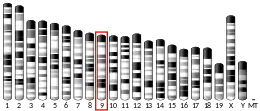Cartilage associated protein
Cartilage associated protein is a protein that in humans is encoded by the CRTAP gene.[5][6]
Function
The protein encoded by this gene is similar to the chicken and mouse CRTAP genes. The encoded protein is a scaffolding protein that may influence the activity of at least one member of the cytohesin/ARNO family in response to specific cellular stimuli.[5]
Clinical significance
Mutations in the CRTAP gene are associated with osteogenesis imperfecta, types VII and IIB, a connective tissue disorder characterized by bone fragility and low bone mass.[7][8]
References
- GRCh38: Ensembl release 89: ENSG00000170275 - Ensembl, May 2017
- GRCm38: Ensembl release 89: ENSMUSG00000032431 - Ensembl, May 2017
- "Human PubMed Reference:". National Center for Biotechnology Information, U.S. National Library of Medicine.
- "Mouse PubMed Reference:". National Center for Biotechnology Information, U.S. National Library of Medicine.
- "Entrez Gene: cartilage associated protein".
- Tonachini L, Morello R, Monticone M, Skaug J, Scherer SW, Cancedda R, Castagnola P (1999). "cDNA cloning, characterization and chromosome mapping of the gene encoding human cartilage associated protein (CRTAP)". Cytogenet. Cell Genet. 87 (3–4): 191–4. doi:10.1159/000015463. PMID 10702664. S2CID 24887051.
- Barnes AM, Chang W, Morello R, et al. (December 2006). "Deficiency of cartilage-associated protein in recessive lethal osteogenesis imperfecta". N. Engl. J. Med. 355 (26): 2757–64. doi:10.1056/NEJMoa063804. PMC 7509984. PMID 17192541.
- Baldridge D, Schwarze U, Morello R, et al. (December 2008). "CRTAP and LEPRE1 mutations in recessive osteogenesis imperfecta". Hum. Mutat. 29 (12): 1435–42. doi:10.1002/humu.20799. PMC 2671575. PMID 18566967.
Further reading
- Marini JC, Cabral WA, Barnes AM (2010). "Null mutations in LEPRE1 and CRTAP cause severe recessive osteogenesis imperfecta". Cell Tissue Res. 339 (1): 59–70. doi:10.1007/s00441-009-0872-0. PMC 3156555. PMID 19862557.
- Gerhard DS, Wagner L, Feingold EA, et al. (2004). "The status, quality, and expansion of the NIH full-length cDNA project: the Mammalian Gene Collection (MGC)". Genome Res. 14 (10B): 2121–7. doi:10.1101/gr.2596504. PMC 528928. PMID 15489334.
- Morello R, Bertin TK, Chen Y, et al. (2006). "CRTAP is required for prolyl 3- hydroxylation and mutations cause recessive osteogenesis imperfecta". Cell. 127 (2): 291–304. doi:10.1016/j.cell.2006.08.039. PMID 17055431. S2CID 8123837.
- Ota T, Suzuki Y, Nishikawa T, et al. (2004). "Complete sequencing and characterization of 21,243 full-length human cDNAs". Nat. Genet. 36 (1): 40–5. doi:10.1038/ng1285. PMID 14702039.
- Chang W, Barnes AM, Cabral WA, et al. (2010). "Prolyl 3-hydroxylase 1 and CRTAP are mutually stabilizing in the endoplasmic reticulum collagen prolyl 3-hydroxylation complex". Hum. Mol. Genet. 19 (2): 223–34. doi:10.1093/hmg/ddp481. PMC 2796888. PMID 19846465.
- Li GH, Kung AW, Huang QY (2010). "Common variants in FLNB/CRTAP, not ARHGEF3 at 3p, are associated with osteoporosis in southern Chinese women". Osteoporos Int. 21 (6): 1009–20. doi:10.1007/s00198-009-1043-6. PMC 2946578. PMID 19727905.
- Bodian DL, Chan TF, Poon A, et al. (2009). "Mutation and polymorphism spectrum in osteogenesis imperfecta type II: implications for genotype-phenotype relationships". Hum. Mol. Genet. 18 (3): 463–71. doi:10.1093/hmg/ddn374. PMC 2638801. PMID 18996919.
- Morello R, Tonachini L, Monticone M, et al. (1999). "cDNA cloning, characterization and chromosome mapping of Crtap encoding the mouse cartilage associated protein". Matrix Biol. 18 (3): 319–24. doi:10.1016/S0945-053X(99)00002-5. PMID 10429950.
- Strausberg RL, Feingold EA, Grouse LH, et al. (2002). "Generation and initial analysis of more than 15,000 full-length human and mouse cDNA sequences". Proc. Natl. Acad. Sci. U.S.A. 99 (26): 16899–903. doi:10.1073/pnas.242603899. PMC 139241. PMID 12477932.
- Kimura K, Wakamatsu A, Suzuki Y, et al. (2006). "Diversification of transcriptional modulation: large-scale identification and characterization of putative alternative promoters of human genes". Genome Res. 16 (1): 55–65. doi:10.1101/gr.4039406. PMC 1356129. PMID 16344560.
- Castagnola P, Gennari M, Morello R, et al. (1997). "Cartilage associated protein (CASP) is a novel developmentally regulated chick embryo protein". J. Cell Sci. 110. ( Pt 12): 1351–9. PMID 9217321.
- Sowa ME, Bennett EJ, Gygi SP, Harper JW (2009). "Defining the human deubiquitinating enzyme interaction landscape". Cell. 138 (2): 389–403. doi:10.1016/j.cell.2009.04.042. PMC 2716422. PMID 19615732.
- Van Dijk FS, Nesbitt IM, Nikkels PG, et al. (2009). "CRTAP mutations in lethal and severe osteogenesis imperfecta: the importance of combining biochemical and molecular genetic analysis". Eur. J. Hum. Genet. 17 (12): 1560–9. doi:10.1038/ejhg.2009.75. PMC 2987020. PMID 19550437.
This article incorporates text from the United States National Library of Medicine, which is in the public domain.
This article is issued from Wikipedia. The text is licensed under Creative Commons - Attribution - Sharealike. Additional terms may apply for the media files.



